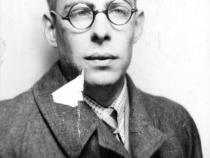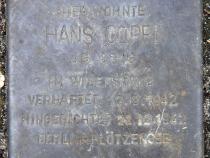Location
Seidelstr. 23
Historical name
Kolonie am Waldessaum
District
Tegel
Stone was laid
05 August 2011
Born
25 January 1916 in Berlin
Occupation
Techniker
Verhaftet
12 September 1942
in
Schrimm bei Posen
Verhaftet
in
Gestapozentrale Prinz-Albrecht-Straße
Excecuted
22 December 1942 in Berlin-Plötzensee
Hans Coppi was born on 25 January 1916 in Berlin. Raised in a family of workers in Wedding – his parents were Communists – Hans Coppi attended the experimental school-farm on the island Scharfenberg in Lake Tegel from 1929 to 1932. In 1931-32 he joined the “Red Scouts” and the Communist Youth Association in Tegel. In February 1933 the Coppi family moved to the newly-founded garden colony “Am Waldessaum” in Borsigwalde.
Wanted for illegally distributing flyers, Hans Coppi was arrested in early February 1934 and taken to Oranienburg concentration camp for a short time before being sentenced to one year’s juvenile detention. On his release from Ploetzensee prison, he rejoined his circle of friends and fellow resistance fighters from Scharfenberg.
From November 1938 he worked as a lathe operator in a small mechanical engineering factory and began taking evening classes to train as a technician. Coppi maintained contact with his old friends from the Communist Youth Association and in 1939 joined a resistance group around theatre dramaturge Wilhelm Schürmann-Horstern. Through his school-friend from Scharfenberg days, Heinrich Scheel, he got to know Harro Schulze-Boysen, a lieutenant in the Luftwaffe, who convinced him to set up radio contact with the Soviet Union. However, the operation failed due to technical problems and a lack of relevant experience. Coppi took part in campaigns to distribute flyers and paste up notices and, in August 1942, looked after Albert Hößler, a parachutist flown in from Moscow. In June 1941 he had married Hilde Rake, a close friend since 1940 who supported his resistance activities.
After being conscripted to the Wehrmacht, Hans Coppi was arrested on 12 September 1942 in Schrimm near Posen. He was questioned and tortured in the Gestapo headquarters in Prinz Albrecht Strasse. In a letter written to his wife in November 1942 in the Gestapo prison he says: “…The smallest things became major experiences for us whenever we did them together. It seems symbolic to me that you came into our little house on that particular day in May, like spring personified. Do you remember how hard it was for you to say ‘yes’ to a future together? It was the start of a new life for both of us.” Having had one opportunity to see his son, on 9 December 1942, Hans Coppi was sentenced to death by the Reichskriegsgericht (the high court of the German armed forces) on 19 December 1942 and murdered at Ploetzensee prison, Berlin, three days later. After 1945, the summerhouse where Hans and Hilde Coppi lived from May 1941, which had been destroyed in the war, was rebuilt and a plaque erected to commemorate the courageous opponents of the Nazi regime.
Wanted for illegally distributing flyers, Hans Coppi was arrested in early February 1934 and taken to Oranienburg concentration camp for a short time before being sentenced to one year’s juvenile detention. On his release from Ploetzensee prison, he rejoined his circle of friends and fellow resistance fighters from Scharfenberg.
From November 1938 he worked as a lathe operator in a small mechanical engineering factory and began taking evening classes to train as a technician. Coppi maintained contact with his old friends from the Communist Youth Association and in 1939 joined a resistance group around theatre dramaturge Wilhelm Schürmann-Horstern. Through his school-friend from Scharfenberg days, Heinrich Scheel, he got to know Harro Schulze-Boysen, a lieutenant in the Luftwaffe, who convinced him to set up radio contact with the Soviet Union. However, the operation failed due to technical problems and a lack of relevant experience. Coppi took part in campaigns to distribute flyers and paste up notices and, in August 1942, looked after Albert Hößler, a parachutist flown in from Moscow. In June 1941 he had married Hilde Rake, a close friend since 1940 who supported his resistance activities.
After being conscripted to the Wehrmacht, Hans Coppi was arrested on 12 September 1942 in Schrimm near Posen. He was questioned and tortured in the Gestapo headquarters in Prinz Albrecht Strasse. In a letter written to his wife in November 1942 in the Gestapo prison he says: “…The smallest things became major experiences for us whenever we did them together. It seems symbolic to me that you came into our little house on that particular day in May, like spring personified. Do you remember how hard it was for you to say ‘yes’ to a future together? It was the start of a new life for both of us.” Having had one opportunity to see his son, on 9 December 1942, Hans Coppi was sentenced to death by the Reichskriegsgericht (the high court of the German armed forces) on 19 December 1942 and murdered at Ploetzensee prison, Berlin, three days later. After 1945, the summerhouse where Hans and Hilde Coppi lived from May 1941, which had been destroyed in the war, was rebuilt and a plaque erected to commemorate the courageous opponents of the Nazi regime.




